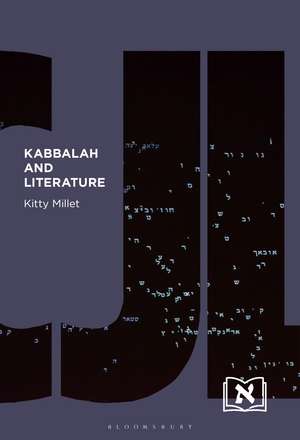Kabbalah and Literature: Comparative Jewish Literatures
Autor Professor Kitty Milleten Limba Engleză Hardback – 7 feb 2024
Preț: 540.15 lei
Preț vechi: 773.88 lei
-30% Nou
Puncte Express: 810
Preț estimativ în valută:
103.35€ • 107.91$ • 85.54£
103.35€ • 107.91$ • 85.54£
Carte tipărită la comandă
Livrare economică 04-18 aprilie
Preluare comenzi: 021 569.72.76
Specificații
ISBN-13: 9781501359682
ISBN-10: 1501359681
Pagini: 272
Ilustrații: 1-2 b&w images
Dimensiuni: 152 x 229 mm
Greutate: 0.53 kg
Editura: Bloomsbury Publishing
Colecția Bloomsbury Academic
Seria Comparative Jewish Literatures
Locul publicării:New York, United States
ISBN-10: 1501359681
Pagini: 272
Ilustrații: 1-2 b&w images
Dimensiuni: 152 x 229 mm
Greutate: 0.53 kg
Editura: Bloomsbury Publishing
Colecția Bloomsbury Academic
Seria Comparative Jewish Literatures
Locul publicării:New York, United States
Caracteristici
Focuses on an international cohort of writers, not only never associated with each other, but also whose Jewish orientation is often rethought in Christological or national terms
Notă biografică
Kitty Millet is Professor of Comparative Jewish Literatures and Holocaust Studies, as well as Chair of the Department of Jewish Studies, at San Francisco State University, USA. She is also chairperson of the International Comparative Literature Association (ICLA) research committee on Religion, Ethics, and Literature. She is author of The Victims of Slavery, Colonization, and the Holocaust: A Comparative History of Persecution (Bloomsbury, 2017) and co-editor of Fault Lines of Modernity: The Fractures and Repairs of Religion, Ethics, and Literature (Bloomsbury, 2018).
Cuprins
AcknowledgmentsIntroduction: Preliminary Remarks- Kabbalah in Fiction- Literature, Mimesis, Fictional Genealogies- Scholem's "Metaphysics" of Kabbalah and Literature- Parsing the Kabbalah in Modern FictionPart 1. The Other's Path and the Redemption of Ben Aher1. Jacob Frank, "Heretic of Kabbalah"2. Heretics and Heresies of Innovation3. Heinrich Heine, Poet/Prophet of the "Innovated Text"4. Kafka, Prophet of Failure5. Being and Nothingness: The Matter of GolemsPart 2. Letter Phenomenologies of Modernist Kabbalahs6. Golems of Text and Bruno Schulz's "Interminable Aggadot"7. The "Absolute Object" in Argentino's Basement8. Lost Letters9. "There Must Be Other Songs beyond Mankind"Conclusion: Literature's Messianic MomentsNotesBibliographyIndex
Recenzii
In a work rich in critical insight and alive to the power and magic of religious narrative and theology, Kitty Millet's marvelous new book argues for the fundamental role that Jewish mysticism and the Kabbalah have played in the formation of modern literature. In these pages, Millet proves herself to be a keen student of the mystics, enchanting us with discussions of language and its secrets while revealing new layers of meaning in some of the foundational texts of modern Western and Jewish literature.
Millet's Kabbalah and Literature is a bold and fascinating work. It embraces the idea of a secular kabbalah with both hands, carries the reader through four centuries of antinomian Jewish literature, and demonstrates how Lurianic and gnostic Judaism, unshackled from tradition but not from Jewishness, achieves a freedom to create, to innovate, and to sustain life within this world and on the written page. The book is lucid about devilishly complex matters. It is also exhilarating, powerful, and full of startling formulations that will haunt readers long after they have put it back on the shelf.
Neither a game nor a superstition, this book reveals kabbalah as a practice that dissolves and recomposes language, mimesis, and society in a supreme questioning of authority. With an astonishing flair for intellectual contact-tracing in a constantly shifting historical landscape, Kitty Millet opens to new scrutiny authors both canonical and little-known, as well as many ways of being Jewish.
Millet's Kabbalah and Literature is a bold and fascinating work. It embraces the idea of a secular kabbalah with both hands, carries the reader through four centuries of antinomian Jewish literature, and demonstrates how Lurianic and gnostic Judaism, unshackled from tradition but not from Jewishness, achieves a freedom to create, to innovate, and to sustain life within this world and on the written page. The book is lucid about devilishly complex matters. It is also exhilarating, powerful, and full of startling formulations that will haunt readers long after they have put it back on the shelf.
Neither a game nor a superstition, this book reveals kabbalah as a practice that dissolves and recomposes language, mimesis, and society in a supreme questioning of authority. With an astonishing flair for intellectual contact-tracing in a constantly shifting historical landscape, Kitty Millet opens to new scrutiny authors both canonical and little-known, as well as many ways of being Jewish.





